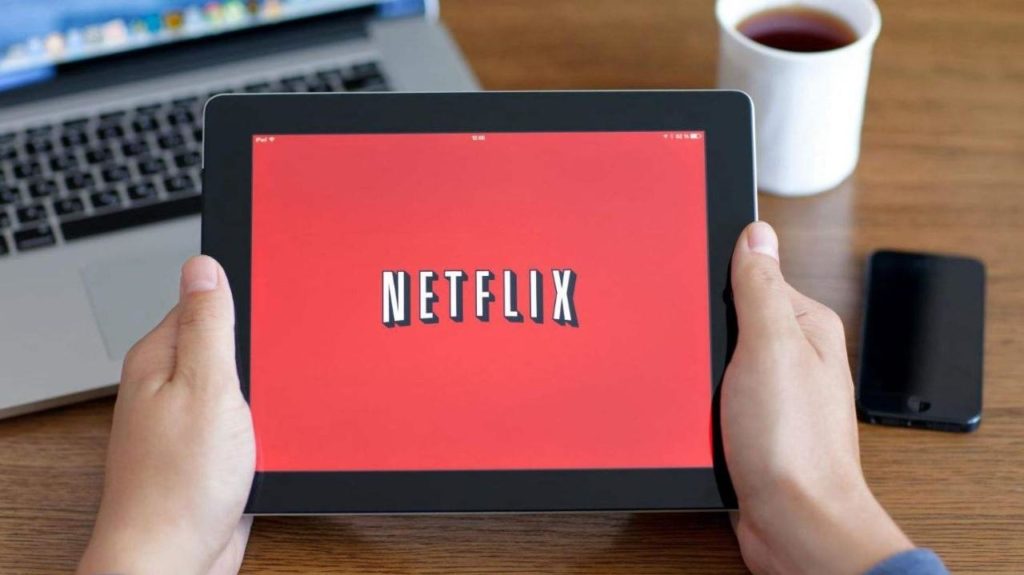Special thanks to:
Geek Movies, Hulu recommendation algorithm technical directorDr. Zhou HanningProvide technical consultation
The biggest shock in Hollywood last month wasMarket value: $160 billionThe streaming giant Netflix surpassed Disney, which had a market value of $158 billion at the time, by a narrow margin.Become the real king of entertainment,A small victory in the battle between Silicon Valley technology companies and traditional Hollywood.
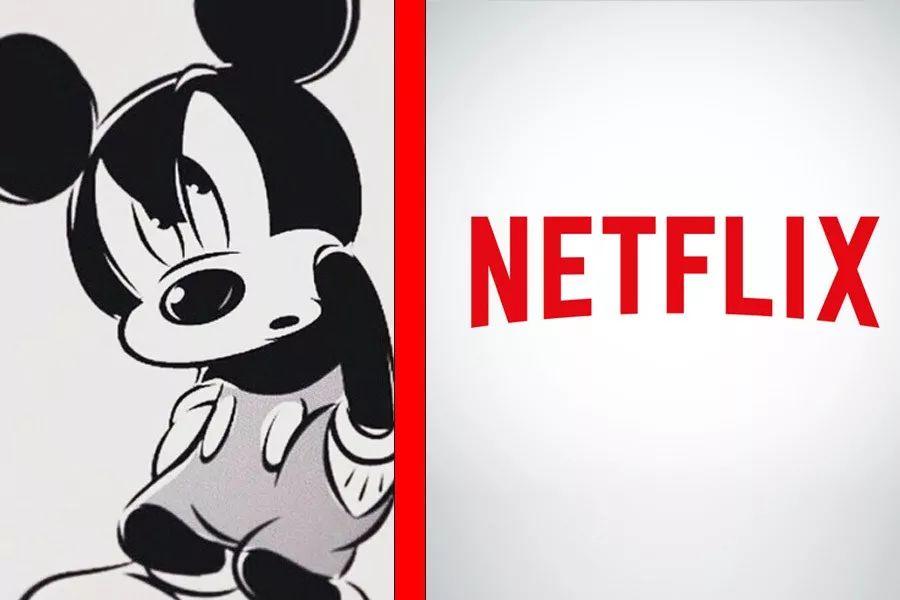
▲ Disney and Netflix's battle for entertainment supremacy
Netflix has nearly 130 million subscribers worldwide,It not only uses "algorithms" to produce content, but also uses "algorithms" to keep users at home and watch the content on their platform one after another., which has had a fatal impact on traditional distribution channels including movie theaters.
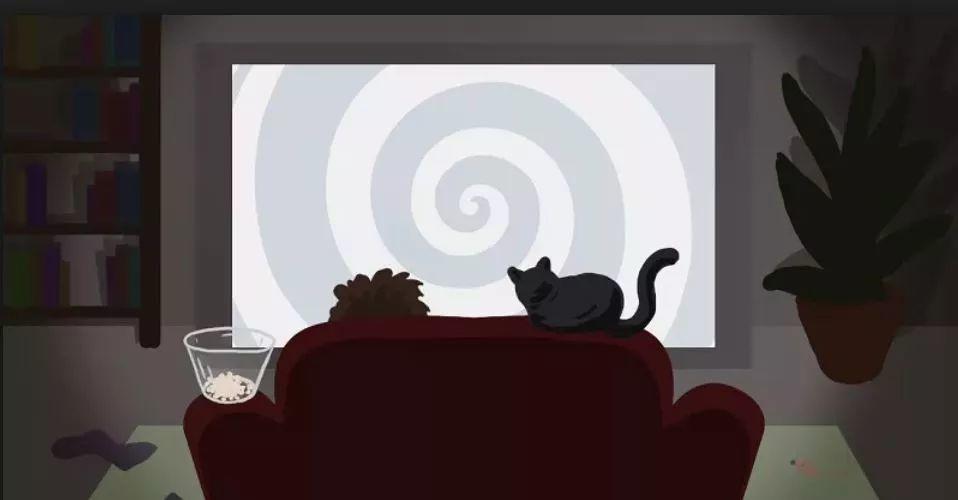

▲ Netflix has spawned a large number of overseas "drama chasers"
It’s not enough to revolutionize distribution, Netflix also wants to revolutionize opinion leaders - users’ subjective comments are no longer important!
Over the past few years, this Internet company has gradually weakened "subjective comments" in a premeditated, planned and step-by-step manner;By the end of this summer, Netflix will be completely abandoning the "user reviews" feature.
What is the logic behind Netflix's move? What impact will it have on future trends in Internet content?
Initially, Netflix’s user review system was similar to the familiar “Dianping APP” and “Douban Movies”, which were divided into two categories:Five-star ratingand"User movie reviews.
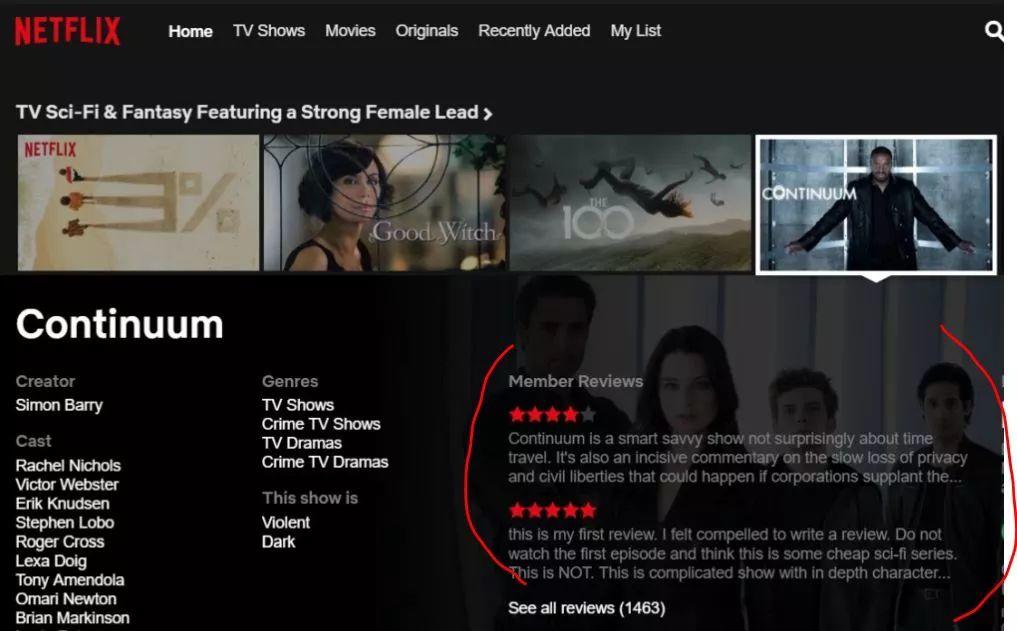
「Five-star rating」, viewers use five stars to rate TV shows or movies;User movie reviews, after viewing the content, viewers can write a subjective comment of 80-1999 characters.
Last April, Netflix used a simpler and more crude "Thumbs up/down like systemReplaced the "five-star rating" system.

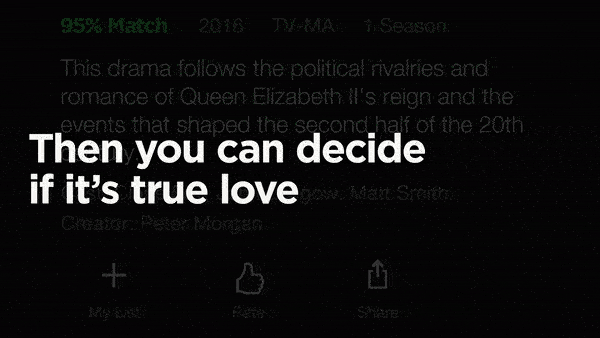
The user's judgment of the content is onlyThumbs up - good"or"Thumbs down - not good".

Netflix said the product was inspired by the swiping algorithms on dating sites.The product manager believes that a percentage-based rating system can provide viewers with a more effective selection reference.
This change has two practical benefits:
First, the fuzzy area of user reviews is removed to make algorithm learning more efficient:
Some users give their favorite movies three stars to show off their taste in movies. The meaning of this is vague enough for humans, and it is even less efficient for machines to learn. The black-and-white "yes" judgment is used to eliminate the gray area.
Second, it makes user feedback less "tangled", lowers the threshold for feedback, increases the number of users who provide feedback, and makes machine learning results more accurate:
Compared with the five options of "five stars", the two options of "yes or no" are easier to participate in and closer to instinct; this way, users like feedback more, which helps to increase the sample size of participating users, thus increasing the accuracy of machine learning.
A Netflix report showed that during internal testing, using the "thumbs up/down" system increased user ratings by 200%.
Netflix believes that the role of "five-star rating" is overrated and is more suitable for people who have a lot of free time to brag about their opinions online:
“Give me a clear signal that you are interested in this content, so we can better understand your preferences and recommend more similar content to you;
Use the thumbs down button to tell us you're not a fan of this content, and it will no longer appear on your homepage.
The direction of your thumb helps us understand and learn your unique taste, so we can more intelligently recommend stories you might like.”
Kill That Annoying Person movie review
After abolishing the "Five Stars" policy, Netflix has also abolished the "User movie reviewsIt's done: As of July 30 of this year, you won't be able to write new movie reviews in the review section; by mid-August, you won't even be able to see previous user reviews.
A Netflix spokesperson told the media:The decision to remove the User Reviews feature completely was made because usage of the feature continued to decline.
However, from the very beginning, Netflix seemed reluctant to allow users to leave subjective comments: the "comments" function is not available on the Netflix app, only on the PC; and the platform has never seriously developed this function.
There may be two real reasons for stopping "user movie reviews":
1. In the streaming model, reviews have become less important to Netflix’s business:
In the days of DVD rental services, user reviews still made sense: after all, it takes two or three days to mail a DVD, and if a user received a particularly bad movie, they would have to wait another two or three days to get a replacement.
However, if you watch a bad movie on Netflix, you can immediately stop it and switch to the next one. The cost of trial and error is extremely low, and it is better to move your fingers than to read other people's subjective evaluations.
2. Netflix has increased its own content, and allowing users to make subjective film reviews will do more harm than good:
Netflix is no longer just a distribution channel for film and television content, today it is a true production company.
"House of Cards", "Stranger Things", "The Crown"... These are original dramas that were produced with real money. Bad reviews and malicious word of mouth are what the film producers cannot tolerate the most.
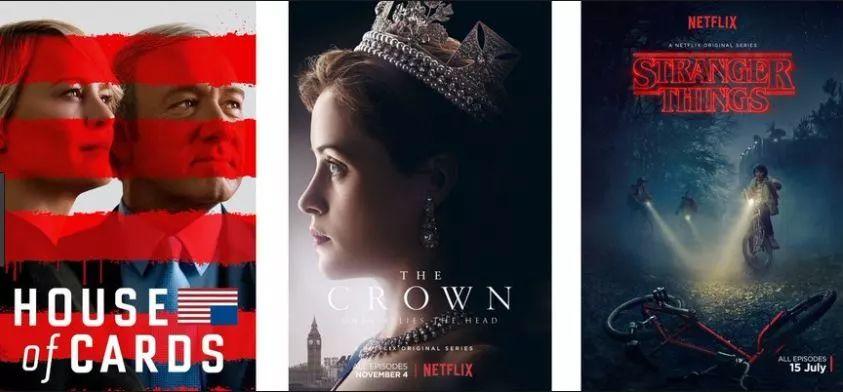
There are endless practices on the Internet of "brushing negative word-of-mouth" to lower program ratings or movie attendance: not long ago, comedy star Amy Schumer's Netflix talk show became a victim of "negative word-of-mouth bombing."
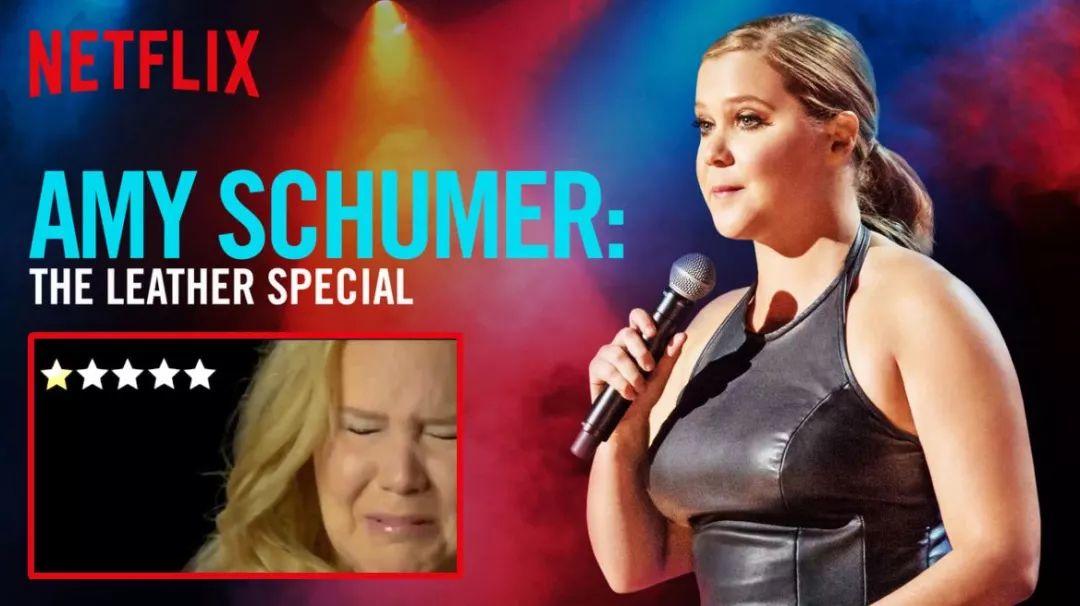

▲"Amy Schumer: The Leather Special" has a lot of bad reviews both inside and outside the network
Last year, Amazon's IMDB closed its user forum, citing "They no longer provide a positive, useful experience for most users.”, Netflix may feel the same way.
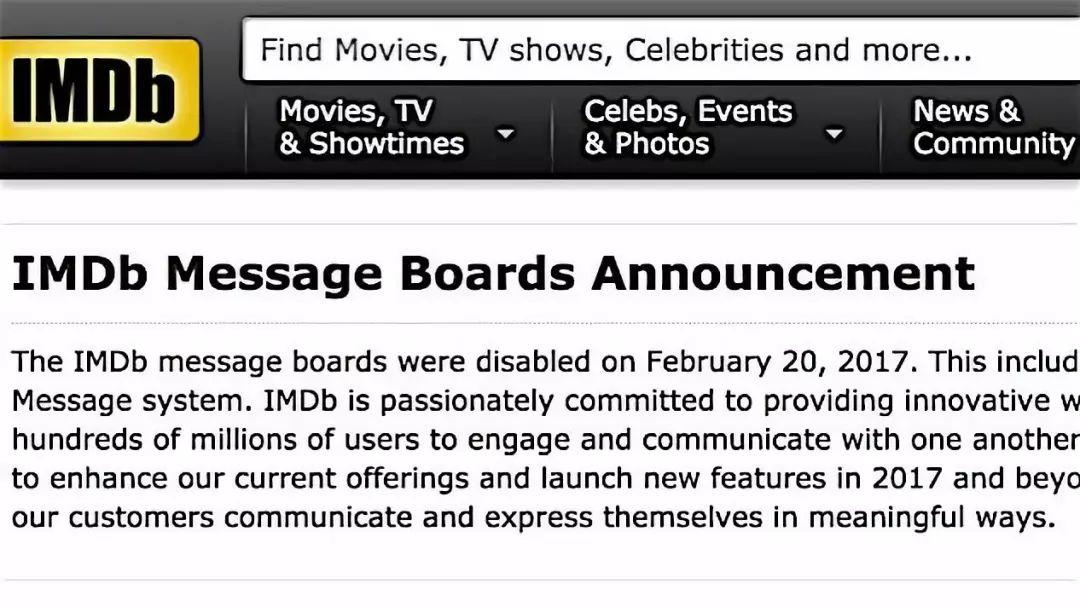
▲ IMDB User Forum Closure Notice
In order to avoid receiving negative reviews, Netflix decided to take the initiative and eliminate these annoying movie reviews first - at least on its own platform.
For those who want to read film reviews seriously, there are countless sources of information out there: you can go to IMDB and Rotten Tomatoes to check the ratings, or search for word-of-mouth on social platforms. If you are more serious, you can also look for some more specialized professional media reviews.
Compared with professional movie fans, Netflix considers more the feelings of the "spectators" - "user reviews" may not significantly increase the ratings. Once negative reviews appear, it will seriously damage the ratings data, which is not worth the loss.
So why keep this "time bomb" next to your own content?
Algorithms are the ultimate weapon for "dimensionality reduction"
Netflix now relies most on"Percentage matching" algorithm based on your viewing habits.
The core standard of this algorithm isIt is your personalized preference (thumbs up and down),It's tailored to you, based on your interests, and gets better with use.
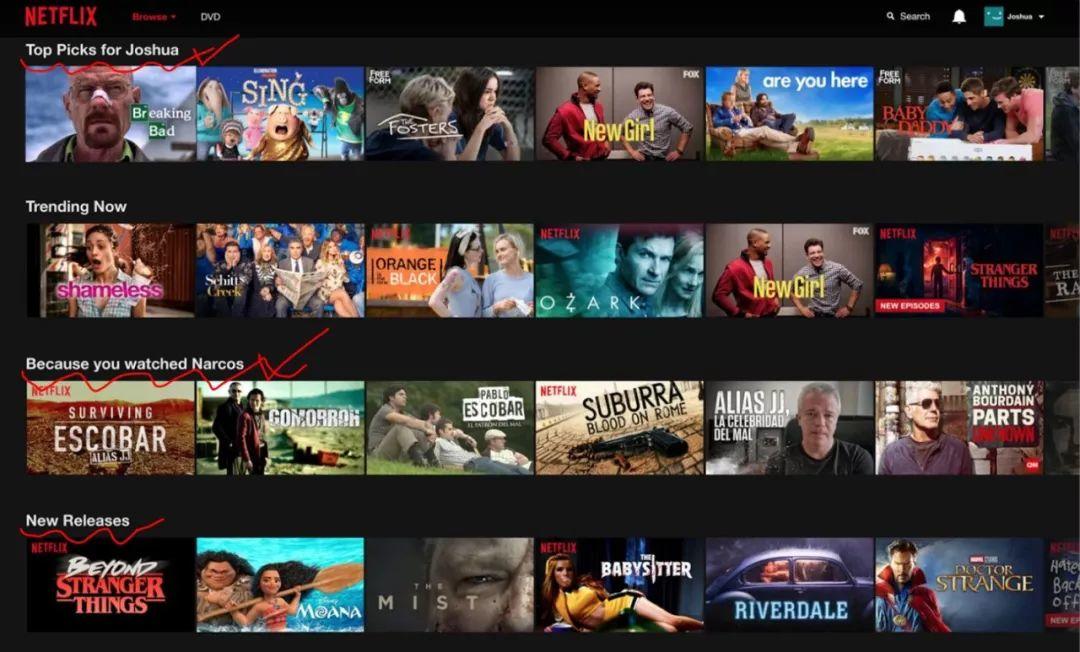
▲ Netflix users enter their personal homepage, and the first and third rows are all algorithm-recommended content
For example, if I am a science fiction fan, I will often receive science fiction dramas and movies recommended by the platform, and most of them are in line with my preferences.
Even if the quality of the content is not as good as I expected, I will still click to watch it - because it is recommended to me by Netflix, and the cost of trial and error is so low, why not give it a try? The worst that can happen is that I will give it a "thumbs down" afterwards.
Netflix will also provide you with "shows your friends like" for reference: you can see the information "10 of your friends also like "Stranger Things"" below the show, which is more lethal than random comments from strangers.
It is somewhat similar to the display logic of WeChat public account articles.Socialization of contentAn attempt at .
but,The most criticized shortcoming of Netflix's algorithm is that it makes viewers very passive- Sit there and wait for the system to "feed" you content; in the long run, the user's initiative in content selection may disappear, the ability to "jump out of the preference framework" will also be lost, and the user's cognitive system will become single and full of prejudice.
As the media giant most favored by the global capital market,Netflix stood on the "algorithm" without hesitation, and accelerated on the road paved by the algorithm, leaving the others far behind.
At this very moment, Netflix is developing a more expensive subscription service -Ultra(Super User), with a monthly subscription fee of nearly $20, itAllows one account to "stream" ultra-high-definition content to four terminal devices at the same time.
Netflix, a wildly growing Internet company, really needs a simpler and clearer way to improve the efficiency and value of its platform. It no longer has the time and energy to be literary and artistic.
